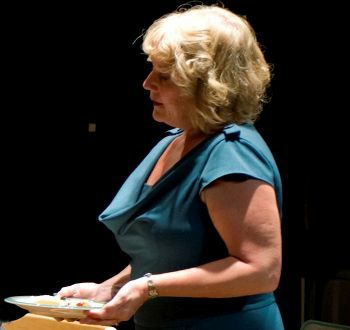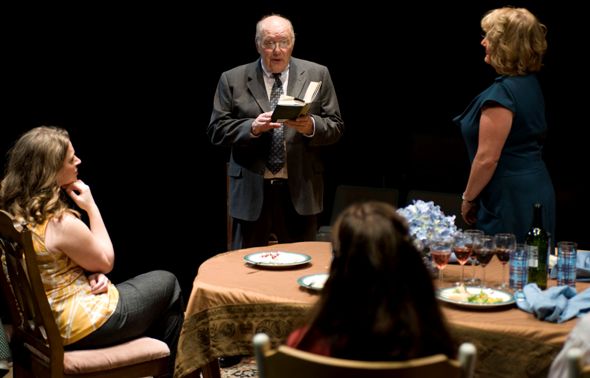Profiles’ ‘Sweet and Sad’ laces remembrance of 9/11 into a family’s tangle of joy and grief
 “Sweet and Sad” by Richard Nelson, at Profiles Theatre through Oct. 7 ****
“Sweet and Sad” by Richard Nelson, at Profiles Theatre through Oct. 7 ****
By Lawrence B. Johnson
How curious, how profound and touching, that Walt Whitman in his poem “The Wound Dresser” should have remembered his Civil War service, nursing brutally injured soldiers, as sweet and sad. The same might be said of our mortality altogether, even of personal hopes and conflicts, relationships and losses. Such is the deep and nourishing dish on the family table in Richard Nelson’s play “Sweet and Sad,” served up with zest and poignancy at Profiles Theatre.
 Nelson’s two-hour drama – or perhaps vignette is more apt – plays out in real time as a family in upstate New York gathers for a Sunday afternoon dinner before a memorial service marking the 10th anniversary of 9/11. Indeed, the play’s premiere took place in New York City on that date, Sept. 11, 2011.
Nelson’s two-hour drama – or perhaps vignette is more apt – plays out in real time as a family in upstate New York gathers for a Sunday afternoon dinner before a memorial service marking the 10th anniversary of 9/11. Indeed, the play’s premiere took place in New York City on that date, Sept. 11, 2011.
The Apple family – grown sisters Barbara, Marian and Jane, their brother Richard and Uncle Benjamin – has its history, and its issues, like any other. Their mutual affection is laced with old hurts and bruised by old grudges. Some in their present lives bear wounds that only love and time can dress.
Tossed into this familial salad is an outsider, Tim, an old flame of Jane’s who went his separate way to marriage and fatherhood – and divorce – and now to everyone’s approval is back with Jane. Tim, played with easy joviality and mellow accommodation by Eric Burgher, is an actor; though a very good one by Jane’s reckoning, he works mostly waiting tables.
 The women’s brother Richard – the quietly assured Darrell W. Cox — is the golden boy, a very successful lawyer. But whereas Richard is a cool head, his sisters are cut from different cloth: All are high strung, petulant, given to meddling and mutually wary. Kate Harris’ Barbara and Harmony France’s Jane make a dauntingly abrasive pair. And both keep putting their foot in the sensitive matter of Marian’s daughter’s recent suicide. Kristin Ford imbues Marian with a raw anguish that’s almost unbearable to watch.
The women’s brother Richard – the quietly assured Darrell W. Cox — is the golden boy, a very successful lawyer. But whereas Richard is a cool head, his sisters are cut from different cloth: All are high strung, petulant, given to meddling and mutually wary. Kate Harris’ Barbara and Harmony France’s Jane make a dauntingly abrasive pair. And both keep putting their foot in the sensitive matter of Marian’s daughter’s recent suicide. Kristin Ford imbues Marian with a raw anguish that’s almost unbearable to watch.
But the character at the center of family concern, the playwright’s theme and our fascination is Uncle Benjamin, once an admired actor but now confined to the stage of the fleeting instant, his short-term memory gone. In a fine-tuned performance, Robert Brueler captures the fragile spirit of a man aware of his own collapsed mental borders and yet who still clings to life at its vital edges.
It is the prospect of hearing Uncle Benjamin read Whitman’s “The Wound Dresser” at the evening’s 9/11 observance that has drawn the family together. Happily, we get to hear it too when Benjamin does a practice run-through. It seems he’s had several practice sessions, though he doesn’t remember them. No, he just opens his book and reads – with a calm beauty and casual pulse that brings one into Whitman’s consciousness, into the realm of his fellow-feeling:
“I thread my way through the hospitals, the hurt and wounded I pacify with soothing hand, I sit by the restless all the dark night, some are so young, some suffer so much, I recall the experience sweet and sad.”
 Genuine sentiments from the lips of a man without a memory, but one who comprehends the very depth and inflection of the lines he’s reading. Playwright Nelson’s dinner is like that: authentic. Food is eaten, second helpings spooned up with wines to wash them down; and past and present converge in happy stories that collide with abiding injuries and fresh sorrows. A family is reminded of its bonds.
Genuine sentiments from the lips of a man without a memory, but one who comprehends the very depth and inflection of the lines he’s reading. Playwright Nelson’s dinner is like that: authentic. Food is eaten, second helpings spooned up with wines to wash them down; and past and present converge in happy stories that collide with abiding injuries and fresh sorrows. A family is reminded of its bonds.
The awfulness of 9/11 seeps into the conversation as if through a fading haze. The siblings still remember where they were, what they were doing on that world-altering day. But Richard wonders when we might just let it go, and stop the annual ritual of breast-beating. And those who died there, the victims: Were they also heroes? What does that mean?
Eventually the subject drifts back to the ineluctable matters of life in the present, the life that continues. Love, family, a good meal, work one would rather not be doing, the suicide of a child – maybe a mother’s part in it.
With its surging dialogue and tumbling emotions, “Sweet and Sad” is an ensemble work par excellence, chamber music fraught with dissonance that never veers into cacophony in the hands of these skilled actors under director Joe Jahraus. Set designer Shaun Renfro’s plain, squared off stage platform is empty when the play begins, then filled with furniture and the meal by the actors and finally emptied again.
First and last, that stark space suggests a consecrated memorial, vacant and unadorned. Experience in it what you will.
Related Links:
- Walt Whitman’s poem “The Wound Dresser”: Read it here
- Performance location, dates and times: Details at TheatreinChicago.com
- Detailed look at Profile Theatre’s complete 2012-13 season: Read an interview with the artistic directors at ChicagoOntheAisle.com
Photo captions and credits: Home page and top: Gathering on the 10th anniversary of 9/11 are members of the Apple family — Richard (Darrell W. Cox), Jane (Harmony France) and Marian (Kristin Ford) with Jane’s boyfriend Tim (Eric Burgher). Descending: Uncle Benjamin (Robert Breuler) reads Walt Whitman’s poem “The Wound Dresser.” Richard (Darrell W. Cox) reassures his forgetful uncle (Robert Breuler). Kate Harris plays Barbara Apple. Below: Uncle Benjamin (Robert Breuler) reads Whitman’s “The Wound Dresser” to his nieces portrayed, from left, by Harmony France, Kristin Ford and Kate Harris. (Photos by Michael Brosilow)
Tags: Darrell W. Cox, Eric Burgher, Harmony France, Joe Jahraus, Kate Harris, Kristin Ford, Richard Nelson, Robert Breuler, Shaun Renfro, Sweet and Sad


